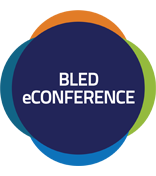Students Bazaar
The Rene W. Wagenaar Students Bazaar
The Bled eConference 2024 will focus on the resilience through digital innovation: enabling the twin transition. We are engaged in the fourth industrial and economical revolution made possible by paradigm-shifting digitization. Preceded by major innovative steps like EDI, eBusiness, mBusiness, self-servicing, big data, Internet of Things, and Blockchains, we continue to be in a digital transformation.
We focused on many aspects pertaining to the dawn of the Digital World as well as how to seize the numerous new opportunities it brings through research and business papers, panels, workshops, and more. Further, we examined issues such as how organizations can benefit from digital innovations, how new businesses are created, but also from the perspective of the individual, including the empowered (ageing) citizen, the entrepreneur, the patient, the consumer, the student, the lecturer, and the employee.
As the theme of the 2024 Bled eConference is Resilience through digital innovation: enabling the twin transition, the Bled Students Bazaar is specifically dedicated to applications and software-based solutions that transform people’s lives in a value-sensitive way. Think of apps that help patients to cope with their medication intake, that helps them stop smoking, which warns them if air pollution is endangering their allergy. But also think of software solutions for citizens that leverage (big) data smartly in a smart city context, for example enabling sustainable and healthy mobility choices, or think of software prototypes that demonstrate new business models, e.g. leveraging Blockchain technology. The possibilities are endless. But what really works? These are the key considerations of this call for proposals.
We call bachelors, honours, masters, and PhD students in information, computer, organization, management, innovation, health, and related disciplines, from all countries, to write a proposal in which the idea is thoroughly described (max. 2000 words, in English). In addition, the following structure must be adhered to for submissions:
- Introduction;
- How does it work (e.g. show screenshots or mockups of the PoC that is being developed);
- Trends (that have an impact on the design or how the concept influences trends);
- Business Canvas (this will demonstrate the feasibility and sustainability of the concept);
- Open challenges/risks;
- References.
Submissions will be evaluated on different aspects such as business innovativeness, technical innovativeness, security and privacy, feasibility, and sustainable added value. When accepted, you will get invited to show and demonstrate the concept during the students bazaar, by means of an oral presentation. We encourage students to create a poster that can be used for marketing purposes during the conference as well as explaining the idea to a broader audience. Important instructions for these presentations are as follows:
- The time slot for each presentation is ten minutes, with an additional five minutes of questions after the presentation. The track chairs will monitor the time and stop the presentation if you exceed ten minutes during the presentation;
- The presentation must be given in English;
- Try to gain the attention of the audience by combining high-quality slides, images, audio, video, etc.;
- The presentation must contain a demonstration of the concept (can be physical, digital or both);
- Be sure to convey important aspects of the concept (e.g. problem statement, challenges, issues, goals, innovation power, security and privacy, and its business model).
Examples of concepts presented during the previous editions of the students bazaar:
- S1REN: A system that pushes load-balanced emergency routes to mobile devices during building fires;
- Meddy: An app that assists in the communication between citizens and physicians, while analyzing healthcare needs to provide medical advice;
- Festitrace: A wristband that can be used to pay by consumers and allows for crowd control by organizers during large events;
- iFocus: An app that, in combination with a device, aims to decrease mobile phone use while driving a car;
- Boxey: An app that standardizes security for IoT devices using a singular platform;
- DocIn: An app that manages automatic registration for events when a user enters the perimeter with the goal to decrease waiting for lines and paper use;
- Happly: A platform that matches volunteers and elderly people to meet with the goal to decrease loneliness;
- Meditext: An app that allows medical personal to communicate in a WhatsApp-style environment with a high-level of security and privacy within the hospitals perimeter;
- Disharelicious: An app to promote sharing leftovers amongst known and unknown people aiming to decrease food waste;
- Traindezvous: An app that allows both regular and business users to meet during regular train rides in order to have a lovely date or to do business;
- Social Power: An app that provides a gamification approach to reduce electricity consumption.
Authors should remember that:
Proposals should be original, unpublished elsewhere, and no longer than 2,000 words. Proposals should be submitted in .doc or .pdf format.
You can download the template here: Bled-eConference-Students-Bazaar-Template-2023
Proposals are submitted via EasyChair (follow the link for research paper submission and choose Students bazaar among conference tracks).
More information: bledconference@um.si
Nerko Hadziarapovic, HU University of Applied Sciences Utrecht, The Netherlands
Marijn Plomp, Vrije Universiteit Amsterdam, The Netherlands
Koen Smit, HU University of Applied Sciences Utrecht, The Netherlands


